Seamless marking for a leading Slovenian bottling company

Radenska ADRIATIC, founded in 1869, is a company with a rich history and a strong focus on innovation and expansion. Today, it is understood to be the largest mineral water producer in Slovenia and a key member of the internationally active Kofola Group — a leading soft drink producer in the Czech Republic and Slovenia.
In addition to mineral waters and soft drinks under its own brand, Radenska also bottles Pepsi products as well as other carbonated soft drinks (CSDs). These products are sold in Slovenia, throughout the Western Balkans along the Adriatic coast, in Europe, the United States and as far as Australia. With a workforce of close to 260 and impressive production volumes, Radenska has firmly established itself as a reliable partner to the beverage industry.
Production challenges
Six large bottling lines are in operation in Radenska’s production halls. These are capable of bottling as many as a million bottles a day — at full capacity, up to 15,000 bottles an hour roll off the production line. This huge output requires all the technology involved to operate seamlessly, presenting a long-term challenge for the company.
The CIJ printers Radenska had been using to apply the mandatory product coding & marking data were prone to weaknesses, especially following production interruptions. The nozzles of the previous printing systems regularly clogged after longer breaks, which in turn led to time-consuming cleaning cycles. This not only affected print quality, but also slowed down production and had a negative impact on overall productivity due to the inevitable delays.
Replacing inefficient printing systems
When Radenska made the decision to replace its existing printing systems, the company called in Vojko Arzenšek, General Manager of ADHEZIV, a LEIBINGER partner and specialist in coding & marking systems. He recommended that Radenska upgrade to premium printers from LEIBINGER. The company had ambitious requirements. The printing systems had to print both cans and bottles to an exceptionally high standard of reliability, while ensuring maximum printer availability. The beverage production environment itself is also challenging, with high levels of humidity and moisture that affect the materials to be printed. The new printers would also be required to keep pace with the high production speeds, and the inks would have to feature special properties.
The tendering process
To identify the best possible solution, Radenska carried out a detailed tendering process involving four different providers. Comparing the coding & marking systems proved to be a complex task, as several technical parameters and product features had to be considered. Originally, Radenska focused purely on the printing systems’ specific functionalities and their purchase prices. However, after a detailed analysis of the offers, the company came to realise that high system availability and productivity were what mattered most. Radenska therefore changed its strategy and focused on TCO (total cost of ownership). The briefing now required a comprehensive, all-inclusive package that included not only the printers themselves, but also the necessary consumables such as ink and solvents, as well as a functional guarantee for a period of five years.
When the new bidding parameters were announced, one supplier withdrew. Arzenšek, on the other hand, requested more detailed information from Radenska about planned production volumes and printing applications so that he could prepare a tailor-made offer. Together with LEIBINGER, he developed a customised package that included several LEIBINGER JET2 NEO CIJ printers, as well as all the required consumables and services. After a thorough review of the offers, Radenska opted for LEIBINGER.
LEIBINGER in action

LEIBINGER printing systems are in full operation on Radenska’s bottling lines, where they greatly support the company’s flexibility. Thanks to LEIBINGER’s unique Sealtronic nozzle sealing technology, which prevents the nozzles from drying out, the printers are ready to use immediately, even after extended breaks. This is also the case when production changes are made or even following lengthy holidays. The Sealtronic technology is designed to ensure that the printers work without delay and with consistent quality once production has restarted. This even applies to the long ink umbilicals of up to six metres that are used in production at Radenska. LEIBINGER offers ink umbilicals of up to 10 metres in length, which provides flexibility when connecting and installing the printers in production.
Another benefit of LEIBINGER printing systems is that the company develops and manufactures its own inks. This enabled the use of a special ink for Radenska that adheres well to a variety of products and dries very quickly despite the humid production conditions.
Arzenšek was delighted with the success of the tender and the positive feedback from Radenska. “The LEIBINGER printers have enabled a significant reduction in downtime and achieved the targeted increase in bottling productivity,” the company said.
“The easy operation of the printers also reduces the training requirements for operating personnel to a minimum. Our customers are extremely satisfied because the inks have excellent adhesion and the printers do exactly what they were designed for — to print efficiently, smoothly and with absolute reliability.”
KRAIBURG TPE FC/CM3/AD1 compound series
The KRAIBURG TPE FC/CM3/AD1 compound series with adhesion to polar thermoplastics is designed for...
Sidel EvoBLOW Laser
Sidel introduced the EvoBLOW Laser to the Middle East at Gulfood Manufacturing 2025.
Packserv four-head, 5 L pneumatic filling machine
The pneumatic filling machine is suitable for food, pharmaceutical, HACCP and TGA-compliant...











